Menu
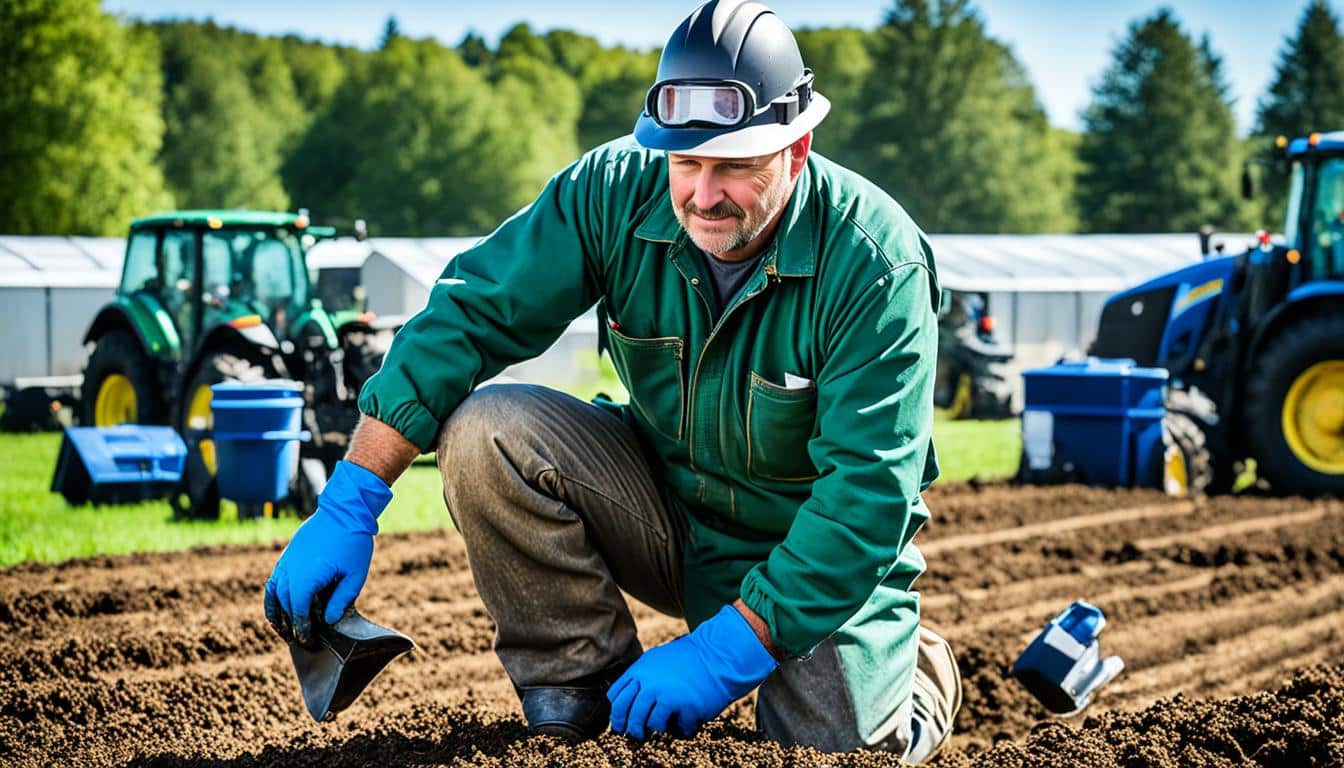
Do you think about how important good protective gear is for farmers today? They deal with many risks, making PPE crucial. Every year, injuries not causing death cost farming about 1 billion dollars. This shows why it’s so vital for farmers to have the best safety equipment. Things like protective suits, gloves, and masks help keep farmers safe from pesticides and other dangers.
Using PPE is a must when it comes to handling pesticides. It’s a rule to follow the labels on these products for how to use them safely. Doing this keeps farmers following the law and stops accidents like poisoning. It helps farming work a lot safer.
Farmers deal with many risks at work, making PPE very important. For example, the danger from pesticides depends on the chemical and how long you’re exposed. Wearing the right protective clothes, from shoes to hats, reduces these dangers.
To lower pesticide risks, use PPE like gloves, masks, and goggles. Always check the label for what safety gear to wear. Each pesticide has its own needed PPE, so make sure you pick the right protection based on these directions.
Keeping PPE in good order is also crucial. This means cleaning, looking after, and storing it properly. NIOSH gives great info and videos on how to use PPE right.
Protecting yourself on the farm is very important. The CDC says 100 farmers get hurt at work every day. Plus, most farm deaths come from tractor accidents. So, using PPE well is key to avoid these dangers.
| Hazard | Recommended PPE |
|---|---|
| Chemicals and Pesticides | Gloves, respirators, protective suits |
| Heavy Machinery | Hard hats, steel-toed boots |
| Animal Management | Protective apparel, gloves |
Making sure farmworkers wear the right PPE is not just a rule, but keeps farming safer.
PPE is crucial in farming. It keeps workers safe from many risks. It cuts down on how often injuries happen and lessens how bad they are.
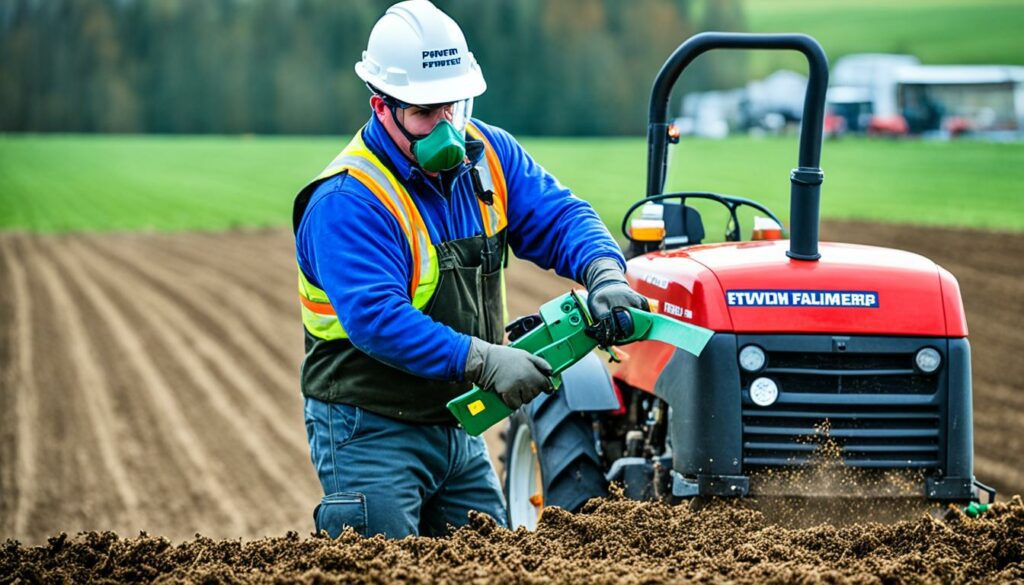
Farming often leads to accidents and injuries. In 2020, over 11,000 injuries made workers take time off. Sadly, 368 people also died, which is a high rate.
Many accidents come from using vehicles like tractors. Farm PPE regulations help make these numbers lower. Gear like steel-toed boots and protective suits are key.
Pesticides are a big danger on farms. They can harm skin, eyes, and if breathed in or swallowed. Using the right PPE helps lower these risks.
Each pesticide needs special PPE to stay safe. It’s important to follow what the labels say on these chemicals. This tells you how to protect yourself.
Things like respirators masks and gloves keep you safe from pesticides. Remember, it’s not just about wearing them, but also using them right. This keeps the equipment working well against harmful chemicals.
| Year | Nonfatal Injuries | Fatalities |
|---|---|---|
| 2020 | 11,880 | 368 |
| 2014 | 12,000 youth injured | N/A |
| 2014-2015 | 42% sprain/strain injuries | N/A |
Robust head protection is key in agricultural safety. It’s vital to have measures in place to protect the head. These steps keep farmers safe from numerous daily hazards. Safety gear for farming is a must due to the many risks present.
Hard hats are a prime farm safety essential. They protect against impacts and falling items. In 2020, 368 farmers and workers died from job injuries. Wearing the right personal protective equipment could have saved many lives.
Tractor accidents cause a lot of these deaths. This fact shows how important wearing protective gear, like hard hats, is. They significantly lessen the harm from accidents involving heavy farming machinery.
Working outdoors in agriculture means facing the sun for long hours. Protection against the sun is crucial. It guards against sunburn, skin cancer, and heat illnesses. This protection in headgear is essential for farmworkers.
The job risks for farmers range from physical injuries to sun-related issues. It highlights the crucial role of protective headgear. By making this a priority in daily work, we make the farm a safer, healthier place. This move cuts down on severe injuries and improves overall health.
For farmers, protective eyewear is vital because they face many daily risks. Just pesticide exposure can badly harm eyes. Choosing the right eyewear reduces these dangers a lot.
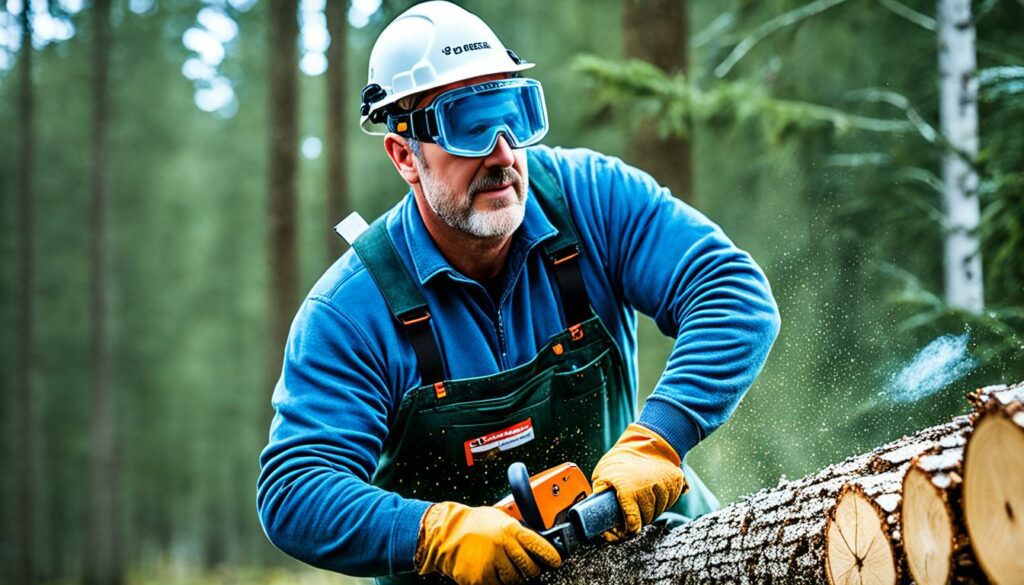
Goggles and face shields are crucial. They protect against physical and chemical dangers. These eyewears keep the eyes safe from pesticides, dust, and other harmful stuff.
UV protection is very important for farmers. They work in bright sunlight, so wearing sunglasses with UV protection is a must. These sunglasses protect the eyes from harmful UV rays and eye damage.
When buying goggles and face shields, comfort and fit are key for max protection. Things like NIOSH presentations can teach good eyewear use and care. This makes protective eyewear work better.
“Wayne Buhler, PhD, and David Jefferson highlight the key role of proper PPE, including eyewear, in farmer health safety.”
Farming has a high risk of death at work, much more than other jobs. So, wearing the right protective eyewear is essential for farm safety.
Work with loud machines on farms poses a serious risk to hearing. It’s key for farm workers to protect their ears with the right gear. Protective ear gear like earplugs, earmuffs, or headphones can help a lot.
The CDC says hearing loss is common in the US. It’s worse for 22 million people who face loud noises at work. Using essential items like earmuffs and earplugs helps greatly to avoid this issue.
For farming, there are different ways to protect your ears:
All ear protection must meet the right standards, like AS/NZS 1270:2002, and be looked after properly (AS/NZS 1269.3:2005). Your workplace should check noise levels and provide the right ear protection to keep noise under control.
For farmers, using good ear protection is a must. It keeps the farm’s noise from hurting you. Knowing how important ear safety is on the farm helps everyone stay healthy and work better.
Agricultural work is full of respiratory hazards. It’s crucial to protect yourself well. Dust and harmful chemicals are big risks that need the right gear.
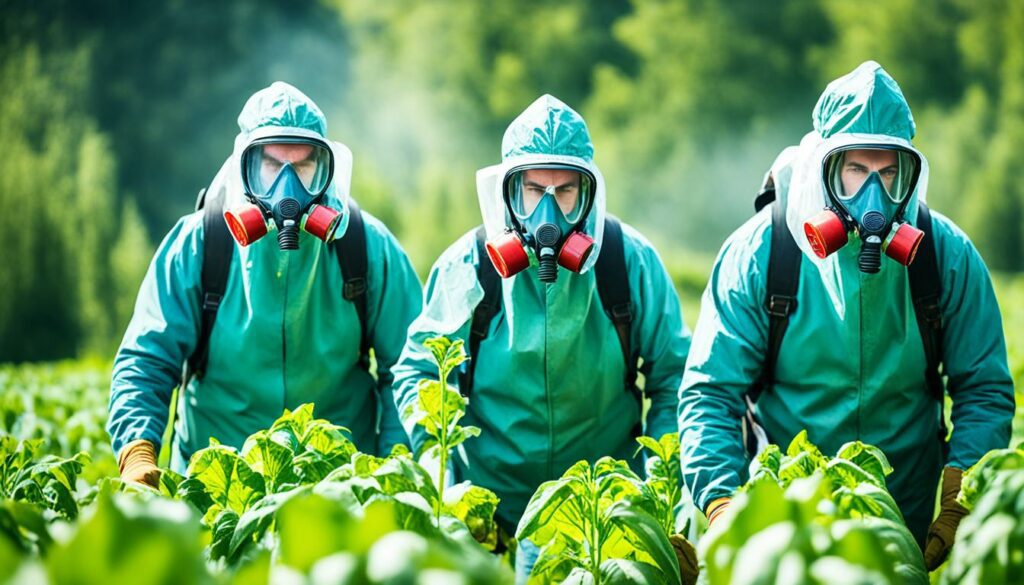
In grain storage areas, working gas masks are a must. They filter out dangerous dust and mould spores. It’s key they fit well and are looked after properly.
For pesticides, special respirators are essential. They create a barrier against harmful chemicals. It’s vital they meet OSHA standards to keep workers’ lungs safe.
The right respiratory protection ensures safety and health in agriculture. It’s important for employers to ensure proper fitting, training, and upkeep of protective gear. This creates a secure workplace that follows OSHA rules.
It’s crucial to keep hands safe in farming because of the many risks. Chemical-resistant gloves for farmers and cut-resistant gloves in agriculture provide key protection. They protect against chemicals and sharp tools, reducing the chance of injury.
Farmers use strong gloves for dealing with powerful pesticides. Chemical-resistant gloves for farmers should be at least 14-mil thick. Nitrile gloves are popular for being tough against chemicals, lasting long, and not costing too much. It’s important that these gloves are not easily pierced. They should be long enough to cover the wrists and prevent chemicals from touching the skin.
Agriculture work often includes sharp machinery and tools that can cut. So, having cut-resistant gloves is vital. These gloves have special parts on them to help you hold onto things better, which is really useful, especially when things are slippery. The inside of the gloves might be different materials, like knit or flock lining, which can change how they feel and absorb sweat. But be careful, they could still have chemicals on them after being used once.
It’s essential to look at what the chemical labels recommend in terms of protective gloves. Also, think about how long you’ll use them, how easy they are to get, and how much they cost. By choosing the right gloves and using them properly, farmers make their work safer without losing efficiency.
Making sure agricultural workers are safe is more than just giving them gloves and helmets. High-quality shoes and leg protection matter a lot too. The right footwear stops injuries and keeps dangerous chemicals off your skin, very common on farms.
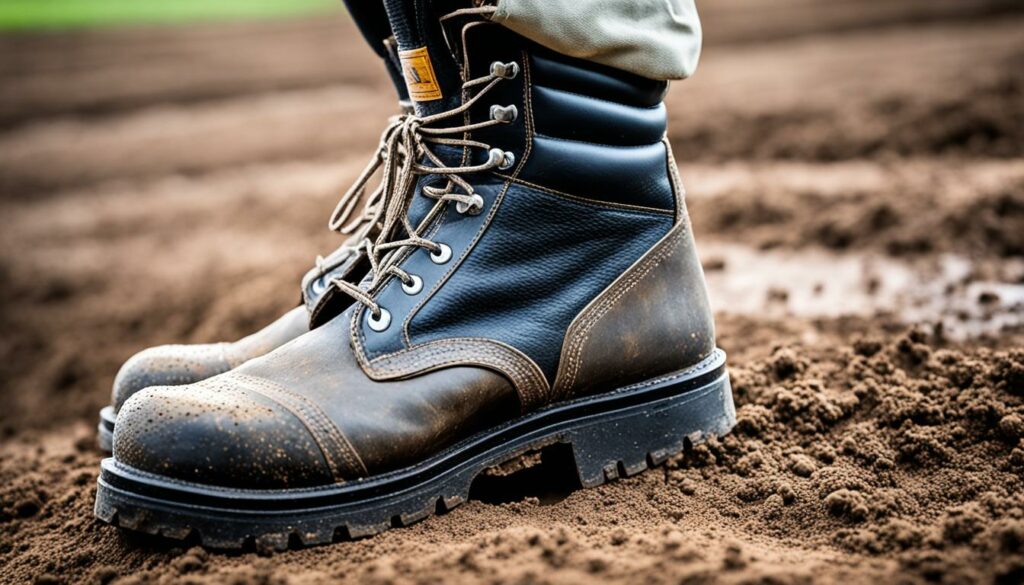
Steel toe boots are a must-have for farmers. They protect your feet from heavy things falling, like machines and animals. These tough boots handle a lot of weight without breaking, giving workers confidence in tough situations.
Chemical-resistant boots are really important on the farm. Farmers use many chemicals, each needing special safety gear according to the US EPA. These boots stop harmful chemicals from touching your skin, preventing bad reactions and health problems.
Choosing the right shoes is key for a farmer’s safety. Whether steel toe boots or chemical-resistant ones, the right choice meets safety standards and keeps you safe from farm dangers.
Chemical-resistant PPE material should be used to prevent the movement of pesticides; however, not all equipment is equally resistant to all pesticides.
Employers must give out proper safety gear like farm boots and make sure it fits, is looked after, and replaced when needed. The right shoes and protection can reduce risks and make the farm a safer place to work.
Full-body protection is key in agriculture. Suits and overalls protect farmers. They make sure farmers are safe when working with animals or chemicals.
Think about this: Not being safe can cost 1 billion dollars a year from not being at work. In 2020, almost 12,000 workers needed time off because they got hurt. Also, almost half of the injuries in 2014-2015 were from lifting or moving things wrong, showing how important safety gear is.
Even worse, 368 farmers and workers died in 2020. Mainly, this happened because of accidents with vehicles. This shows how crucial it is to have the best protective gear.
Protective overalls for farmers are made to a high standard. There are different levels of protection. For basic tasks, level D is enough. For things like handling dangerous dust, level C with a mask is needed.
Kool Dri® rain suits are very strong and meet level D standards. They are great for tasks like power washing. They fit well and come with a long warranty, proving their quality.
Good full-body gear is not just durable but also designed well. It keeps farmers safe and helps them work better. Safety is as important as productivity in farming.
| Statistics | Impact |
|---|---|
| Cost of Nonfatal Injuries | $1 Billion Annually |
| Days Away from Work (2020) | 11,880 Injuries |
| Crop Worker Sprain/Strain Injuries (2014-2015) | 42% |
| Youth Injuries on Farms (2014) | 12,000 (4,000 from farm work) |
| Fatalities (2020) | 368 (18.0 per 100,000 workers) |
Farmers must have the right PPE to stay safe from the many dangers they face. This gear protects them from things like chemicals and heavy machines. Each item is made to guard against specific risks. This helps in making sure farmers are safe in all kinds of work environments.
Nonfatal injuries in farming cost about 1 billion dollars a year. This shows how important it is to take safety seriously on the farm.
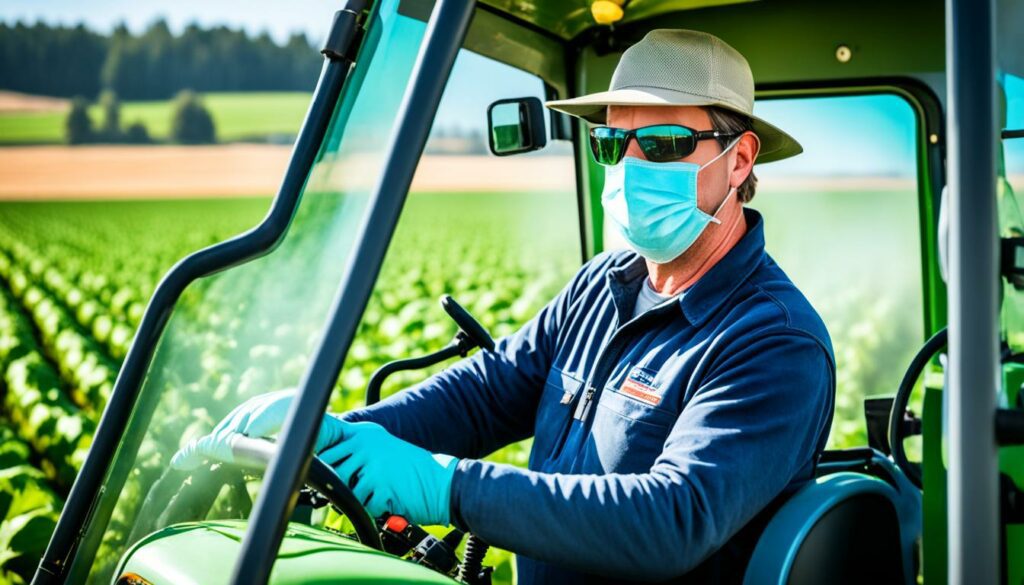
There were 11,880 farm incidents in 2020 that led to time off work. For this reason, a wide range of PPE is available for farmers. This includes items like:
Making sure all necessary safety gear is used not only meets safety regulations but also cuts down on injuries. The CDC says 100 farmers are hurt at work every day. This shows the urgent need for better safety through the correct PPE.
Over half of farm-related deaths are because of tractor accidents. 40% of farmers have had close calls with tractor rollovers (Ohio State University, 2005). OSHA has rules to help prevent these tragedies with the right safety gear.
| Type of PPE | Protection Provided |
|---|---|
| Hard Hats | Protection against head injuries from heavy machinery |
| UV-Protection Eyewear | Prevents eye damage from sunlight and chemical exposure |
| Hearing Protectors | Guards against hearing loss from loud machinery |
| Respiratory Masks | Safe handling of pesticides and other harmful substances |
| Gloves | Chemical and cut resistance for hand safety |
| Steel-Toed and Chemical-Resistant Footwear | Foot protection against injury and hazardous chemicals |
| Full-Body Suits | Comprehensive protection for high-risk tasks |
Using the right PPE can greatly improve the safety of farmers. It lowers the chance of accidents and creates a safer, more productive farm.
To keep personal protective equipment (PPE) working well on farms, it’s vital to care for and store it properly. Knowing the right ways to clean and store PPE can make a big difference in safety. This ensures your gear stays ready to protect and serve you well.
Cleaning your PPE for farm work varies depending on what you’re dealing with. Things like suits and gloves get washed with a gentle soap and water. However, masks might need a stronger disinfectant, following what the maker says. Checking your PPE often, cleaning on time, and using the correct methods can make it last longer. This keeps you safe from harmful stuff like pesticides and chemicals.
Storing your protective gear right is half the battle of keeping it in top form. PPE needs a spot that’s clean, dry, and gets fresh air to avoid getting spoiled. Sun and chemicals are no friends to things like gloves and masks, so keep them away. Putting labels on where you store them can help keep things neat. It also makes sure you can find and use your equipment easily when you need to.
| Type of PPE | Cleaning Technique | Storage Method |
|---|---|---|
| Protective Suits | Wash with mild soap and water | Store in a dry, ventilated area |
| Gloves | Inspect and wash regularly | Keep away from sunlight |
| Respirators | Disinfect as per guidelines | Use labeled containers |
| Eye Protection | Rinse with clean water | Store in protective cases |
In the agriculture sector, employers have a big job. They must make sure workers can get and use personal protective equipment (PPE) correctly. This important task means sticking to OSHA rules, giving out needed gear, and teaching farmers how to use them.
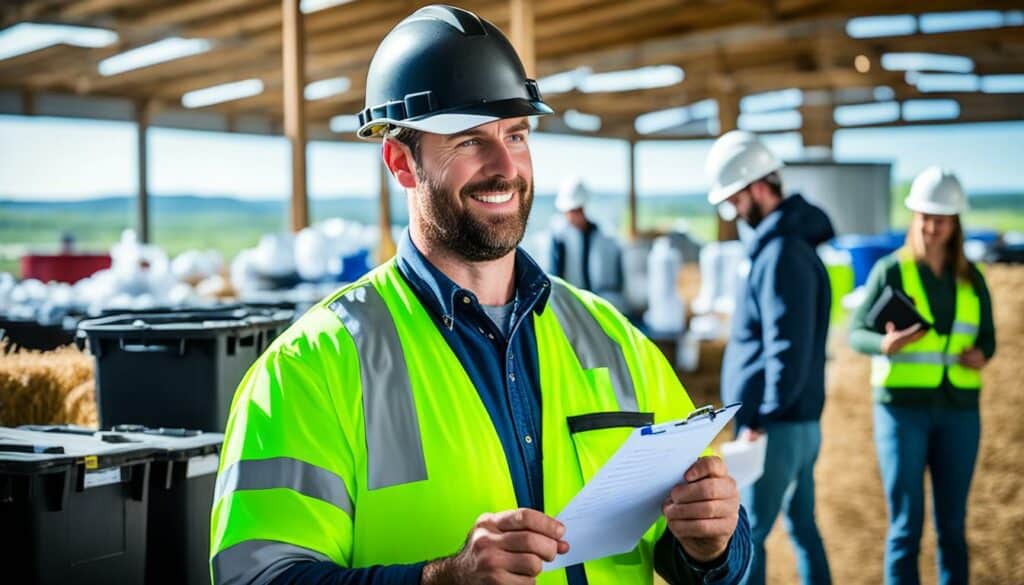
Sticking to OSHA standards for farm PPE is a must. Companies have to have a thorough PPE program. This should cover dangers, how to choose and care for PPE, and making sure workers know how to use them right. PPE should also meet ANSI standards for safety in various job types.
Giving the right gear for the job is an employer’s key task. They have to provide items like hard hats, goggles, and more depending on the farm’s needs. Providing these helps cut down on accidents and keeps farmers safe while they work.
Teaching workers how to use PPE is a continuous duty. Employers must make sure their staff knows when and how to use protective gear. They need to conduct regular training to keep everyone up to speed with the latest safety info.
| OSHA Standards | Employer Responsibilities | Training and Education |
|---|---|---|
| Implement PPE program | Provide necessary equipment | Ensure ongoing training |
| Address hazards | Maintain PPE | Monitor effectiveness |
| Meet ANSI standards | Write contracts in native language | Provide performance reviews |
Avoiding PPE mistakes on farms is a big issue. Many use the wrong gear for the job. This leads to less protection against risks. For example, using gloves that don’t stop chemicals with pesticides can be very risky. It’s vital to always use the correct PPE on farms.
Proper care for farming protective gear is key too. Some farmers forget to clean and keep their PPE in good shape. It’s a must to clean it as told by the maker. Dirty or worn-out equipment can fail, making you less safe. So, always look after your PPE well.
Getting dressed in PPE wrongly is a serious mistake. If you don’t put it on or take it off right, you might get harmed. Knowing the right way to do this is important. Everyone should be taught. This ensures everyone stays safe on the farm.
Having safety and health plans in writing is very important. They help legally and financially, especially if accidents happen because rules were not followed. Farming is risky, especially for new farmers. So, make and follow safety rules to reduce these dangers.
Getting more people to help with safety also makes a big difference. This guide says that when workers and family help plan, safety gets better. This means fewer accidents. It’s about always being careful and checking for dangers to stay safe.
To wrap up, staying safe on farms means doing several things right. Choosing the right gear, looking after it, using it well, and involving everyone in safety. Doing this keeps workers safe and helps the farm do better.
The farming world keeps changing, thanks to new PPE tech. These new gadgets aren’t just about safety; they’re changing how farmers view their work gear.
Big steps have been made in innovative materials for farming PPE. These materials are more effective and last longer. Now, farming gear made with new polymer and nylon mixes can beat the military’s waterproofing standards. This means gear that can handle tough farm conditions so farmers can work without worry.
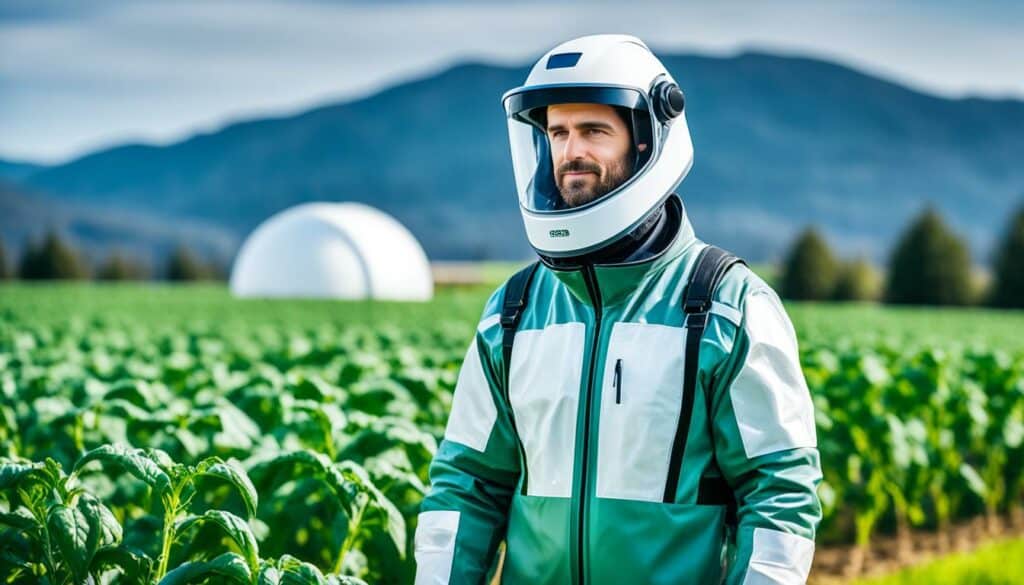
Farmers can now work longer and safer thanks to more comfortable gear. Technological advancements in PPE bring in comfy designs and breathable materials. Fall, when times are tough and long, becomes a bit easier. Making durable agricultural protective gear comfy helps farmers keep working without feeling the strain.
The following table showcases some key innovations in PPE materials and their benefits:
| Material | Benefits |
|---|---|
| Polymer-Nylon Combinations | High waterproof rating, enhanced durability |
| Breathable Fabrics | Increased comfort, reduces heat stress |
| Ergonomic Designs | Improves wearability, reduces fatigue |
*Personal protective equipment (PPE)* in agriculture is key. Farmers meet many dangers, like chemicals and heavy machines. Sadly, many are hurt or die at work every year. This shows how important safety gear is.
OSHA sets firm rules to make farms safer. If farmers follow these, they can stay safer. Good gloves and sturdy shoes help a lot, especially against common injuries.
PPE gets better with new tech and materials. This makes safety gear more comfy and easier to use. First aid kits made just for farms are a good example. By focusing on PPE, we can improve safety on farms. This will help our agriculture a lot.
Farmers need protective suits, gloves, and hard hats for safety. They also must have respiratory gear, eyewear, and hearing protection. Shoe-wise, steel-toed boots and chemical-resistant footwear are a must. For some jobs, full-body protection is necessary.
PPE keeps farmers safe from pesticides, heavy machinery, and other dangers. It cuts down on injuries and deaths. Plus, rules require its use.
Hard hats are vital for dangers from machines. Wearing hats with UV protection guards against serious sunlight harms.
Goggles and face shields protect against hazards. Farm workers also need sunglasses with UV protection for safety against dust and sun glare.
Earplugs or noise-cancelling headphones are key. They stop loud machines from hurting farmers’ ears.
In places like grain storage, farmers need gas masks. These stop breathing in dangerous dust and spores. Working with pesticides needs respirators that filter out toxins.
To deal with chemicals, use chemical-resistant gloves. Cut-resistant gloves are a must for sharp tools and thorns, keeping hands safe.
Wear steel-toed boots for heavy objects and compression dangers. For hazardous materials, pick chemical-resistant footwear.
Rain suits or chemical protective gear keep the whole body safe. They’re needed for jobs near animals or dangerous substances. They help farmers meet health rules too.
Clean PPE the way the maker says and keep it in a cool, dry spot. This makes it last longer and stay effective. Taking care of your gear is important.
Bosses must give the right PPE, following OSHA rules. They should also teach workers how to use and look after their gear. This can make the farm a safer place.
Mistakes like not wearing PPE correctly, forgetting to clean it, and using the wrong gear can be dangerous. Learning the right way to use PPE is crucial to stay safe.
New materials and designs in PPE like polymer and nylon make gear better. They’re more comfortable and last longer, improving safety for farmers.